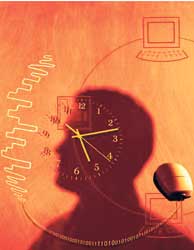
Creating timeMy obsession with the whole concept of 'time' peaked again during the last few weeks, during which it seemed rather straightforward to me that the use of computers is mostly –if not all, about time. Machines that do things faster than us 'save' time. So faster cars, faster toasters, microwave ovens that cook food much faster than conventional ovens and barcode readers that process our grocery list faster at supermarket counters, have all ousted their slower and therefore inferior predecessors. Among this flood of 'faster' technology though, computers occupy a special place because of their versatility and applicability in a broad range of time-saving technologies.
Most computers can only do one thing at a time. Yet they give us the impression that they are capable of doing many things at the same time by switching between each task at speeds that we will never notice. Yet, by allowing a user to type out an email while downloading a movie, while listening to music, while talking to a distant friend on VoIP telephony, computers have become mini-home-based time factories. Accomplishing multiple tasks in one single chunk of time allows us in a way to virtually duplicate time (which I suppose is another way of saying 'save time'). Machines that substitute for us, 'create' time by freeing us even momentarily from time's unrelenting grip; so that we may do 'something else.' Computers today, squeeze in roughly ninety times more work into one second, than they did ten years ago, essentially creating more time than they did then. Faster computers are also more expensive, because they presumably carry out more tasks per unit of time and therefore 'save' more time than their older versions. "Time is money" indeed, and given the rate at which computer prices change however, the price of time in the open market seems to be very volatile. Not only do computers create and save time, but they are also capable of chopping up time into fine pieces, price-tag them and transport time to be marketed or auctioned. Thanks to super-fast computer networks and the Internet, we can now transport time into the remotest of places and in small chunks. They have made the trade of time ubiquitous. User-friendly interfaces have greatly simplified these transactions. Certain advertising models on the Internet for example, offer payment or other rewards of monetary value for anyone to trade in seconds and minutes of their time to watch advertisements or fill out surveys. Mobile phone calls are billed by the second. Millions of ordinary people in front of computers around the world buy blue-chip stocks, and sell them within minutes for a hefty profit.
So the next time you sit at your computer, you become in a sense a participant in these transactions. You will in fact be spending a fraction of your lifetime writing to a friend, to buy something you need, read something interesting or simply wonder through a maze that has been created using the collective human experience. It is a trade nevertheless, and as in any form of business, there will be profits and losses that need to be accounted for at the end.- technopage@gmail.com |
|| Front
Page | News | Editorial | Columns | Sports | Plus | Financial
Times | International | Mirror | TV
Times | Funday
Times || |
| |
Reproduction of articles permitted when used without any alterations to contents and the source. |
© Copyright
2007 | Wijeya
Newspapers Ltd.Colombo. Sri Lanka. All Rights Reserved. |
